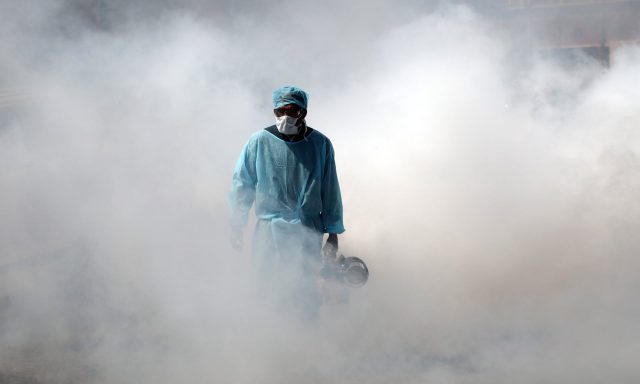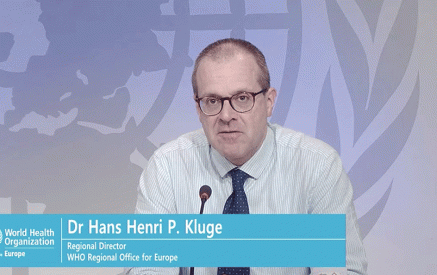Press statement by Dr Hans Kluge, WHO Regional Director for Europe
With more than 37 million cases and nearly 830 000 deaths, the trend in the WHO European Region shows decreasing cases for a fifth week in a row. For the first time since September last year, the number of new cases reported in a week is less than a million. Although still high, new deaths also declined for the third consecutive week.
Transmission in most of the Region has begun to slow. Europe now accounts for a decreasing proportion of the global burden of disease and mortality, currently at 28% of new cases and 21% of new deaths.
Dual-track approach
Read also
When cases of COVID-19 are at lower levels in many countries, as they are now, health authorities are presented an opportunity to focus on evaluating and improving the performance of their response. To that end, I have written to all health ministers in the European Region, providing an assessment of the current situation and a checklist of additional actions that Member States should consider.
But this is also a time to prepare our health services to get back on track, strategize, and deliver health services beyond the COVID-19 response.
Globally, 9 out of 10 countries report disrupted essential health services. Cancer patients have been hugely impacted. They are more vulnerable due to their weakened immune systems, and their treatments have been postponed or halted. For some countries, sending cancer patients abroad for treatment has become impossible.
COVID-19 wards have not been the only ones reaching a breaking point in past months. Several psychiatry wards have too. Some feel guilty for speaking about their fatigue while others are literally fighting for their lives. Many of us are trying to deal with a roller coaster of emotions: anxiety, grief and depression.
Antimicrobial resistance is another growing peril, threatening the effective prevention and treatment of infections. Research conducted in 9 countries and areas where treatment guidelines are not available or followed, where people can buy antibiotics over the counter, shows a concerning rise in the use of antibiotics based on the misconception that antibiotics can prevent COVID-19.
One study, based on global data, estimated that in a period of 12 weeks in 2020, some 28.5 million surgeries that had been scheduled had to be cancelled due to COVID-19.
Childhood immunization programmes have been disrupted in almost all countries, with temporary suspension of vaccination programmes in some countries.
These are only a few of the many issues that need attention.
Immunizing health workers
In the coming weeks, as more and more health workers get immunized, the capacity to address the backlog of postponed surgeries, cancelled chemotherapy and halted vaccination campaigns also grows. This is where our focus needs to gradually shift, while suppressing COVID-19 transmission.
A resilient health system requires adequate human resources to ensure everyone, everywhere, receives services. To date, between 1% and 46% of health workers, or 19% on average, have completed a COVID-19 immunization series, based on available information from 20 countries in the Region.
A stronger, vaccinated health workforce, fewer COVID-19 hospital admissions, and fewer deaths as older population groups get vaccinated should give us space and time to recalibrate – in itself a monumental task.
Waging a war on numerous fronts requires resources and vigilance, and once again, those carrying the heaviest burden are health workers.
In the past year, health workers have put their own lives on the line every single day, and shown extraordinary resilience and compassion. For their sacrifice and commitment, I have nothing but respect – particularly as it is they who are now called upon to deliver vaccination programmes.
It is they who will be tasked with getting our routine and essential health services back on track to tackle the collateral effects and fallout of this pandemic. They have gone to extreme lengths, and are now required to go further.
To allow them to do this, those of us who do not work on the frontline must continue to act responsibly and follow protective public health and social measures so that our health systems can strive to save not only COVID-19 patients, but also those with diabetes, cardiovascular disease, cancer or tuberculosis.
No time to drop our guard
What matters now is how we respond to positive epidemiological trends.
Despite an overall encouraging picture, improving epidemiology can prompt a sense of security that results in hasty decision-making that in turn leads to a resurgence of cases.
This slowing spread of the virus, for the most part, is driven by public health and social measures. We as individuals have the power to undermine the positive trend we see today or support it on its course. We have the tools. Let’s continue using them to full effect.
Although new variants pose additional challenges, all of them are SARS-CoV-2 and all can be controlled with the tools we have at hand. Several countries have significantly decreased transmission of these variants.
Some 40 countries in the European Region have started vaccinating against COVID-19. Nonetheless, in the 30 countries that have provided data, only 1.8% of the population has received a complete vaccine series. Vaccines are certainly a game changer, but since supply is limited, our most effective tools remain public health and social measures.
Faced with reports on new variants, confusion and fatigue are understandable. But let me assure you that the circumstances are temporary. Yes, we will still need to take precautionary measures for months to come, but if we all play a role and shoulder the responsibility to keep transmission rates low, the restrictive measures that have been put in place will be lifted.
Now is the time to minimize the damage inflicted by severe disruption of health services, to counteract the collateral effects of COVID-19 while simultaneously keeping it under control.
Stay safe. Thank you.
Copenhagen, 19 February 2021
WHO/Europe Press





























































